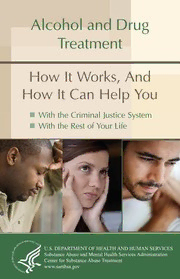
Alcohol and Drug Treatment: How It Works, and How It Can Help You PDF
Preview Alcohol and Drug Treatment: How It Works, and How It Can Help You
Alcohol and Drug Treatment How It Works, And How It Can Help You With the Criminal Justice System With the Rest of Your Life U.S. DEPARTMENT OF HEALTH AND HUMAN SERVICES Substance Abuse and Mental Health Services Administration Center for Substance Abuse Treatment www.samhsa.gov Contact with the criminal justice system is an opportunity for you to make a positive change. Why get treatment? Using drugs or alcohol may have contributed to your arrest or re-arrest. While drugs or alcohol are not an excuse for criminal behavior, your arrest gives you an opportunity to break free of drugs or alcohol. Whether you are released or kept in custody, you should consider getting treatment for your drug or alcohol problem. You still have to go through the criminal justice process. Ask if a drug court is available. • You may be able to choose drug treatment instead of jail or prison. • You could get a lighter sentence, or your charges could be dropped, if you go to treatment. However, if you don’t follow the program the charges can be reinstated and you could get an even worse sentence. Treatment is more than doing time. It is hard work, but it offers you much more than just serving a sentence. What is drug and alcohol treatment? Treatment means • Going to drug counseling and group meetings • Avoiding the people, places, and situations that get you into trouble • Working with your counselor to show that you are really trying to change your life • Learning things like anger management and job skills so you have more choices in life. Where do I start? • Recognize that you are sick and tired of being in trouble. • Ask your family to help you get in—and stay in— treatment. • If you remain in custody then you should ask a court or probation officer about getting help with your drug or alcohol problem. • If you are released on bail you have other resources. Ask your lawyer or a court officer about programs in the area, or look on the back of this brochure. You may have more choices and opportunities than you think. Here are some additional ways to find help: • Call 1-800-662-4357 and an operator will tell you what treatment programs are near you. Or you can go online at http://dasis3.samhsa.gov/. • Local Alcoholics Anonymous and Narcotics Anonymous groups are listed in the white pages of your phone book. • Other drug and alcohol treatment programs are listed in the yellow pages. Look under “Drug Abuse.” • State-run programs are listed in the blue pages under the local health department. When you do get into treatment, talk to your counselor about your privacy rights. It is your choice how you will handle your current situation. Drug treatment can be the start of a better life. Do not reproduce or distribute this publication for a fee without specific, written authorization from the Office of Communications, Substance Abuse and Mental Health Services Administration, U.S. Department of Health and Human Services. This brochure was created to accompany the publication Substance Abuse Treatment for Adults in the Criminal Justice System,#44 in CSAT’s Treatment Improvement Protocol (TIP) Series. The TIP series and its affiliated products are available free of charge from SAMHSA’s National Clearinghouse for Alcohol and Drug Information (NCADI). Call 1-800-729-6686 or 1-800-487-4889 TDD (for the hearing impaired), or visit www.csat.samhsa.gov. DHHS Publication No. [SMA] 07-4292 Printed 2007
